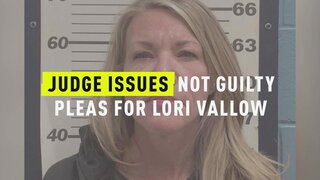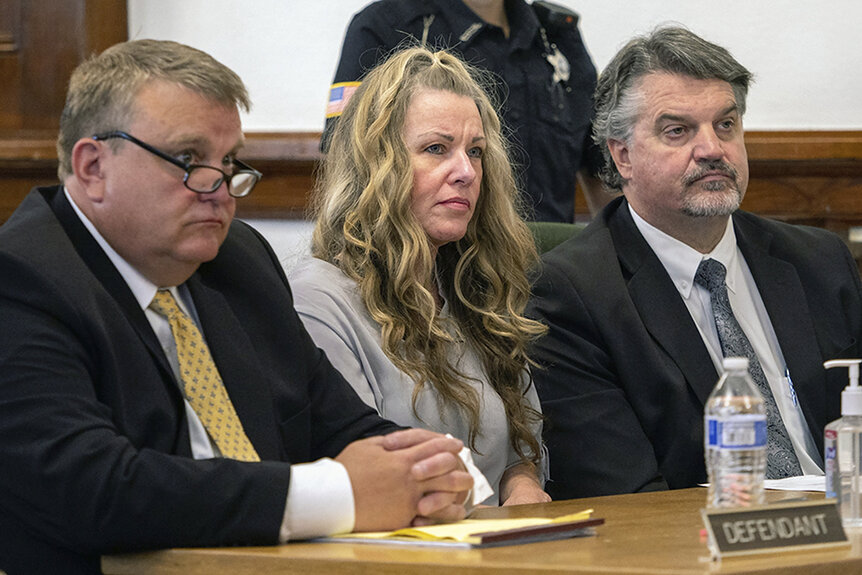Create a free profile to get unlimited access to exclusive videos, breaking news, sweepstakes, and more!
Judge Bans Cameras From The Courtroom In Lori Vallow Case
The judge overseeing Lori Vallow's murder trial made the decision to ban cameras from all future court proceedings after determining that visual media coverage of the case could pose "a great risk to the fair administration of justice."

No cameras will be allowed in Lori Vallow’s future court proceedings after a judge ruled that the intense media interest in the case could pose “a great risk” to the Idaho’s mom ability to get a fair trial.
District Judge Steven W. Boyce handed down the order Friday after requests were made by both the prosecution and defense team to ban video and photographic coverage of the case.
The judge will continue to allow audio recordings taken by court staff.
“The Court determines herein that continued visual coverage of this case poses a great risk to the fair administration of justice in this case, and Co-Defendant Chad Daybell’s companion case, which cases are joined for trial,” stated the order, which was obtained by Oxygen.com. “Therefore, continued visual coverage will no longer be permitted.”
RELATED: What Did Lori Vallow Accuse Husband Joseph Ryan Of, According To 'Sins Of Our Mother'?
Vallow and her fifth husband, Chad Daybell, are charged with murder in the deaths of her children, Tylee Ryan, 16, and Joshua “JJ” Vallow, 7. The children’s bodies were discovered on Daybell’s Idaho property in June of 2020 after a months-long search to find the missing siblings.
Boyce made the decision to ban cameras after reviewing video footage from an Aug. 16 hearing in the case, where Vallow could be seen in photos smiling.
The judge determined the footage showed an “inordinate focus” on Vallow, including “zooming onto her face throughout the vast majority of the hearing, regardless of who was speaking or what was happening.”
Boyce said that he witnessed “no misconduct on any part of the media during these hearings” but believed the issue was more centered around the “significant media attention worldwide” that the case has generated.
“While the right to public access must be protected, the scope of the coverage cannot supersede the rights of all parties to the fair administration of justice in this case,” he wrote in the decision. “Courts have historically struggled with the issue of permitting cameras in the courtroom. Going back decades, cases have been overturned by the U.S. Supreme Court because of issues relating to extensive media coverage.”
“In this day and age, the problem is further exacerbated, where instantaneous access to coverage provided by traditional media outlets is quickly rebroadcast, repackaged, and reimagined,” he continued. “The Court has previously been made aware and continues to be informed that documentaries, dramatizations and fictionalized movies focusing on the Defendants allegations in this case have already been produced and continue to be disseminated to the public. All of this continues to occur in a case which has not yet been tried.”
Boyce said that he was concerned that allowing cameras into the courtroom could “impede the ability of the parties to select fair and unbiased jurors.”
While explaining his decision, he noted that “continued coverage of pre-trial motions will likely cause potential jurors to be biased, disqualifying them from service” and said the trial had already been moved out of Fremont County to Ada County—the most populous county in the state—in an effort to mitigate the effect of any pre-trial publicity and gain access to a larger jury pool.
Boyce also raised concerns about the impact cameras could have on jurors during the trial.
“The Court will not risk the loss of seated jurors who may intentionally or inadvertently review the very trial proceedings they are sworn to decide, where those jurors must make their decision only upon the evidence presented at trial,” he wrote.
He also expressed concerns that video coverage could add “unnecessary pressure” for witnesses slated to testify in the trial and may unintentionally expose them to media coverage of the case.
“The Court will not risk the potential loss of State or Defense witnesses who may intentionally or inadvertently become tainted by viewing the trial proceedings before they testify, assuming their exclusion from the proceedings, as is regularly ordered for material witnesses,” he wrote.
The trial for Vallow and Daybell was initially slated to begin in October but it got pushed back earlier this year to January of 2023, according to local news outlet KTVB.
In addition to the murder and conspiracy charges connected to the death of Vallow’s two youngest children, the couple are also facing charges connected to the October 2019 death of Daybell’s first wife, Tammy.
In addition, Vallow is facing conspiracy charges in Arizona in the July 2019 death of her fourth husband, Charles Vallow, who was shot to death by her now deceased brother Alex Cox. Cox, who claimed self-defense in that case, died in December 2019 of what was determined to be the result of natural causes.
The couple have pleaded not guilty to the charges against them.

























